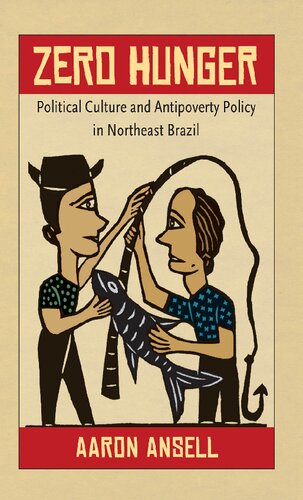

Most ebook files are in PDF format, so you can easily read them using various software such as Foxit Reader or directly on the Google Chrome browser.
Some ebook files are released by publishers in other formats such as .awz, .mobi, .epub, .fb2, etc. You may need to install specific software to read these formats on mobile/PC, such as Calibre.
Please read the tutorial at this link. https://ebooknice.com/page/post?id=faq
We offer FREE conversion to the popular formats you request; however, this may take some time. Therefore, right after payment, please email us, and we will try to provide the service as quickly as possible.
For some exceptional file formats or broken links (if any), please refrain from opening any disputes. Instead, email us first, and we will try to assist within a maximum of 6 hours.
EbookNice Team

Status:
Available0.0
0 reviews
ISBN-10 : 1469613972
ISBN-13 : 9781469613970
Author: Aaron Ansell
When Luiz Inácio Lula da Silva of Brazil’s Workers' Party soared to power in 2003, he promised to end hunger in the nation. In a vivid ethnography with an innovative approach to Brazilian politics, Aaron Ansell assesses President Lula’s flagship antipoverty program, Zero Hunger (Fome Zero), focusing on its rollout among agricultural workers in the poor northeastern state of Piauí. Linking the administration’s fight against poverty to a more subtle effort to change the region’s political culture, Ansell rethinks the nature of patronage and provides a novel perspective on the state under Workers' Party rule. Aiming to strengthen democratic processes, frontline officials attempted to dismantle the long-standing patron-client relationships — Ansell identifies them as “intimate hierarchies” — that bound poor people to local elites. Illuminating the symbolic techniques by which officials attempted to influence Zero Hunger beneficiaries' attitudes toward power, class, history, and ethnic identity, Ansell shows how the assault on patronage increased political awareness but also confused and alienated the program’s participants. He suggests that, instead of condemning patronage, policymakers should harness the emotional energy of intimate hierarchies to better facilitate the participation of all citizens in political and economic development.
Chapter One: Convulsions of Democracy from National Politics to Local Hunger
Chapter Two: Hunger, Envy, and Egalitarianism in Passarinho
Chapter Three: Intimate Hierarchy and its Counters
Chapter Four: The Prodigal Children Return to the Countryside
Chapter Five: Induced Nostalgia
Chapter Six: Programmatic Pilgrimage
Chapter Seven: Marginalizing the Mayor
zero hunger in america
zero hunger articles
zero hunger problem
no poverty and zero hunger
poverty and hunger article
Tags: Zero Hunger, Political Culture, Antipoverty Policy, Northeast Brazil, Aaron Ansell